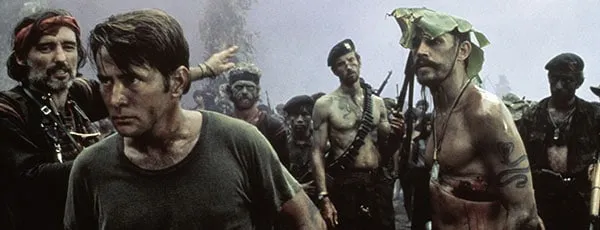Eye For Film >> Movies >> Apocalypse Now Redux (1979) Film Review
Apocalypse Now Redux
Reviewed by: Angus Wolfe Murray

Editor's Note: The version of this film screening at the 2019 Tribeca Film Festival will be Apocalypse Now: The Final Cut
This is not a remastered reissue of Francis Ford Coppola's epic war movie, loosely based on Joseph Conrad's The Heart Of Darkness and scripted by the macho houndog of the Californian surfing community, John Milius. It is another film, a better film.

The Seventies version was closer to Conrad than it was to Vietnam. The famous helicopter attack on the fishing village, with Wagner roaring out over onboard speakers, culminating in Colonel Kilgore's (Robert Duvall) comments on napalm ("It smells like victory") and explosions going off all over the place seemed like a frontpiece to the real drama, which was a journey up river to Cambodia by a bunch of disparate grunts.
Coppola says that he re-edited the film from raw footage, rather than slotting in 50 minutes of deleted material here and there to beef it up a bit. When you realise that the raw footage represents 370 hours, that's more than a warm wallow in nostalgia over a weekend with Walter Murch, the man who cut the original.
Returning to it after 22 years is a reminder of Coppola's tenacity and perfectionism. Just about everything conspired against him. What should have lasted four months and cost $16million, lasted 15 months and cost $32million. Three weeks into production Harvey Keitel was replaced by Martin Sheen, who had a heart attack 12 weeks later. A hurricane hit the Phillippines and destroyed the sets. When Marlon Brando appeared, he was too big to fit any of the uniforms. Reputedly paid $1million a day, he spent the first week discussing his characterisation of Kurtz and was constantly threatening to quit.
It looks beautiful. Coppola's use of the fade, rather than the more fashionable jump cut, is artistically sweet. Sheen's performance makes you think that if James Dean had lived, he would have played Willard. Laurence Fishburne, aged 14, as Clean, the youngest member of the crew, is heartbreakingly good, as is Duvall, who gets more to do, creating a man drunk on the power of his own invincibility.
The new scenes enhance the story in every possible way. The feeling of being part of an insane war is brought back into the centre ground. Kilgore's little adventure, so that he can catch a few waves ("Charley don't surf"), illustrates the vanity of command. The Playboy bunnies sequence that always seemed like a loony break from the paranoia of the river, where soldiers nursed their fantasies courtesy of Mr Hugh Hefner, is brought to earth when Willard's crew meets up with the girls later in totally difference circumstances. Almost surreal in its location and innocence, this episode adds to a better understanding of the men.
The scenes with the French planters are bizarre for a different reason. These colonial outcasts appear to live surrounded by jungle and there are quite a few of them in the same house and they dress for dinner and drink wine from crystal glasses. Willard listens, a hand shielding his eyes from the setting sun. They talk politics. "You are fighting for the biggest nothing," he is told. He watches Roxanne (Aurore Clement) across the table in the dreamy light and their emotions flow together in the quiet of the evening.
This is a much needed respite before gliding through mist, accompanied by the beat of a single drum, to Kurtz's camp where madness and horror coexist. The ending has always been difficult and remains so now. Coppola films Brando in shadow. "You're an errand boy sent by grocery clerks to collect the bill," Kurtz tells Willard, as if he knows why he's there. Sheen appears in shock. He acts like a man in a dream. Brando reads T S Eliot. It is as strange as strange can be.
Undoubtedly, a masterpiece, this three-and-a-half hour version puts body on the flesh of what was already a great movie. As well as the acting, as well as the photography, as well as the soundtrack, Michael Herr's narration elevates the art of voice-over to something deeper than poetry.
"Never get out of the boat. Absolutely goddam right! Unless you're going all the way."
This time, Coppola does so. It's a journey you will not forget.
Reviewed on: 22 Nov 2001

















